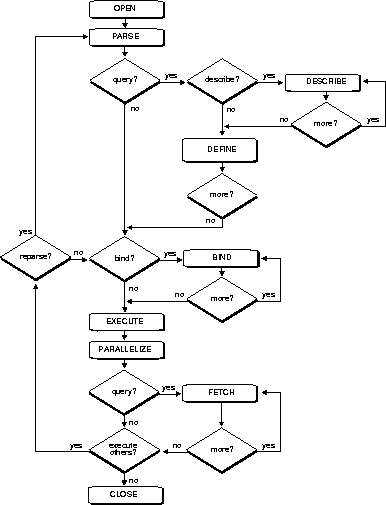| Oracle7 Server Tuning | Library |
Product |
Contents |
Index |
| Oracle7 Server Tuning | Library |
Product |
Contents |
Index |
The following sections describe each phase of SQL statement processing for each type of SQL statement. As you read this information, remember that for many Oracle tools, several of the phases are performed automatically. Most users need not be concerned with or aware of this level of detail. However, you might find this information useful when writing Oracle applications.

The Stages in Processing a SQL Statement
Assume that you are using a Pro*C program to increase the salary for all employees in a department. Also assume that the program you are using has made a connection to Oracle and that you are connected to the proper schema to update the EMP table. You might embed the following SQL statement in your program:
EXEC SQL UPDATE emp SET sal = 1.10 * sal
WHERE deptno = :dept_number;
The parse phase includes processing requirements that need to be done only once no matter how many times the statement is executed. Oracle translates each SQL statement only once, re-executing that parsed statement during subsequent references to the statement.
Several issues relate only to query processing. Queries include not only explicit SELECT statements but also the implicit queries in other SQL statements. For example, each of the following statements requires a query as a part of its execution:
INSERT INTO table SELECT ...
UPDATE table SET x = y WHERE ...
DELETE FROM table WHERE ...
CREATE table AS SELECT ...
In particular, queries
In this case, the describe phase is used to determine the characteristics (datatypes, lengths, and names) of a query's result.
This process is called binding variables. A program must specify the location (memory address) where the value can be found. End users of applications might be unaware that they are specifying bind variables because the Oracle utility might simply prompt them for a new value.
Because you specify the location (binding by reference), you need not rebind the variable before re-execution. You can change its value and Oracle looks up the value on each execution, using the memory address.
Unless they are implied or defaulted, you must also specify a datatype and length for each value if Oracle needs to perform datatype conversion. For more information about specifying a datatype and length for a value, refer to the following publications:
For some statements you can specify a number of executions to be performed. This is called array processing. Given n number of executions, the bind and define locations are assumed to be the beginning of an array of size n.
Transaction management, session management, and system management SQL statements are processed using the parse and execute phases. To re-execute them, simply perform another execute.
In addition to determining which types of actions form a transaction, when you design an application you must also determine when it is useful to use the BEGIN_DISCRETE_TRANSACTION procedure to improve the performance of short, non-distributed transactions.
|
Prev Next |
Copyright © 1996 Oracle Corporation. All Rights Reserved. |
Library |
Product |
Contents |
Index |